In the real and mighty jungle…
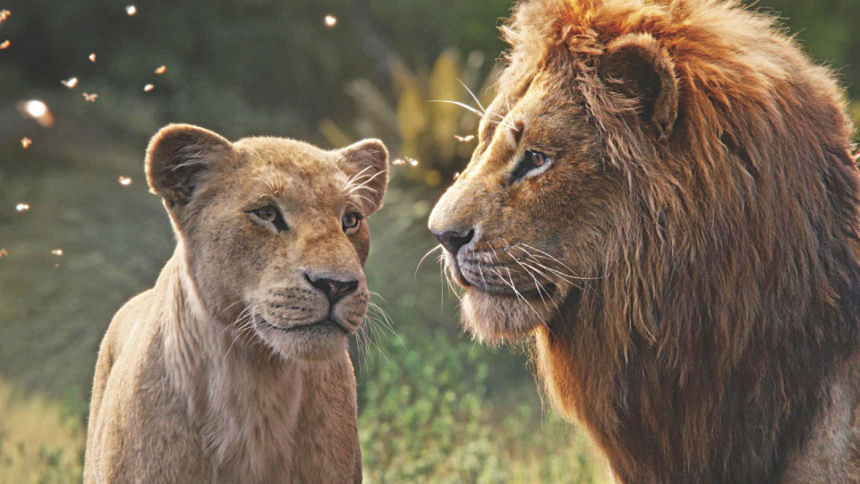
When we were kids, my younger cousin and I had a favourite game. Smaller and more agile, my cousin would hang off the side of the bed or a table, his squishy feet dangling and threatening to land painfully on the floor. My hands held his captive at the edge until they (fake) scratched him and I yelled “Long live the king!” and he hurtled into the great abyss of the ground. (He was never actually pushed off the bed. Someone always caught him before the fall). The game was passed down when his younger brother was born; but this newer cub was first also presented to the family airborne close to the ceiling, held up at the armpits as if by a wise old baboon. “NANTS INGONYAMA BAGITHI BABA,” we chanted loudly in the background.
It’s probably just one out of countless other household stories inspired by the 1994 Disney cult classic. The Lion King, when it came out, was a game-changer for Disney’s movies for a number of reasons, as a recent New York Times piece reminds us. It was created by two first-timer composers Roger Allers and Rob Minkoff. It was Disney’s first animation without any human characters. It was a summer release unlike the holiday releases of The Little Mermaid, Beauty and the Beast and Aladdin—the preceding movies responsible for the 1990s ‘Disney Renaissance’. And it was significantly richer in violence and dark themes than most Disney animated movies, so much so that many adults were worried about kids watching the film.
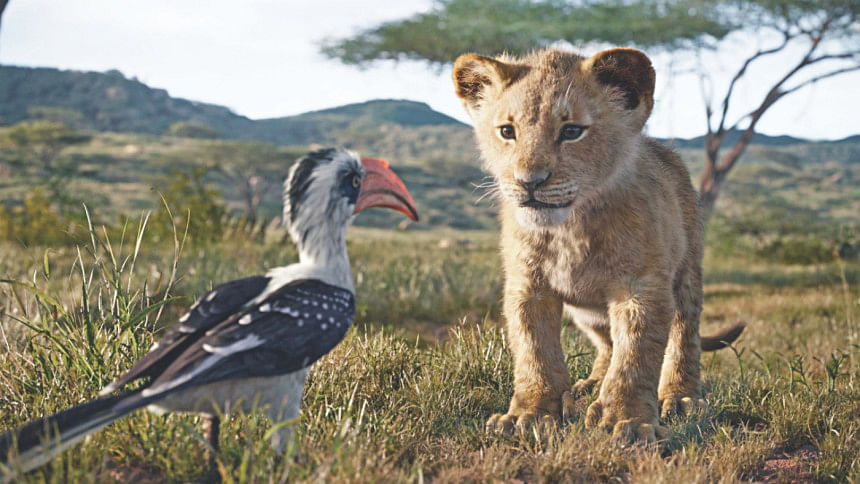
Despite these risks, The Lion King earned USD 24 million in the opening weekend at home and went on to become Disney’s highest grossing film to date, as well as the “best-selling VHS tape in history”. Elton John’s composition became a 10-times platinum soundtrack, with Can You Feel The Love Tonight bagging the ‘Best Original Song’ award at the 1995 Oscars. More significant than these numbers is just how widely the movie permeated childhood memories and pop-culture references for several entire generations—birthing the easiest reference to Shakespeare’s Hamlet, one of the most iconic father-son stories onscreen, and certainly the most iconic motto for dealing with life’s problems with “Hakuna Matata”.
Is this why Jon Favreau’s live action Lion King seems so hesitant with creative liberties? Scared of disappointing a devout fanbase?
Released July 19 and screened here in Dhaka from July 26 (at Star Cineplex and Blockbuster Cinemas), the new live action adaptation is breathtaking visually. The Pride Lands glow as vividly as a Serengeti savanna at sunrise and every animal—the lion, the zebra, the elephant, the antelope, the hyenas, the warthog and the meerkat—all twitch and breathe and move in flawless imitation of their real life counterparts. Every fur on their bodies bristles as realistically as do the grasses of the surrounding landscape. Baby Simba is tear-inducingly adorable.
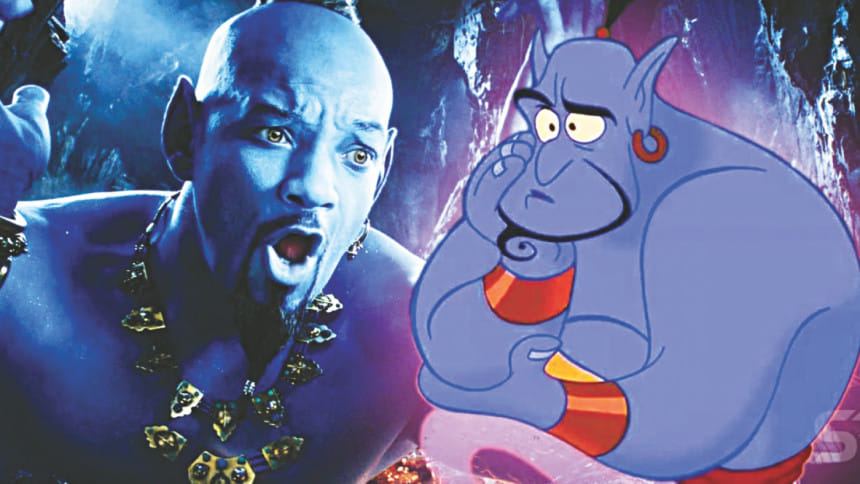
But the visuals do more than cause wonder; they also communicate important messages about the Pride Landers’ dynamics. Every dark scene in the elephant graveyard is followed by a brighter one set in Mufasa’s kingdom “touched by the light”. Disposing of the need for a black mane to mark his innate “evilness” as in the cartoon, live action Scar wears his difference from his golden-glowing sibling in his bony, wilting, greyish frame. He isn’t the ugly evil sibling just because, you realise. He’s actually a lion that looks menacing because he’s famished; he’s uglier because he lives in a dingy cave and amidst muddy puddles, not in Mufasa’s sun-drenched Pride Rock. He’s resentful because he’s been deprived and possibly abused, as is implied by a handful of fleeting dialogues. He’s still the clear villain, sure, but his villainy offers glimpses of a backstory (mapped out in the Lion King-inspired book The Tale of Two Brothers). By thus rendering each of the creatures so realistic visually, the CGI accomplishes half the job of character development in the movie.
The bad news, however, is that it does the job rather too well. Favreau’s feat with special effects had previously brought the fun-filled drama of The Jungle Book beautifully to life. There, juxtaposed against Mowgli’s human presence, the beasts had straddled quite gracefully the real world of jungle-animal politics and the imagined world of their anthropomorphic parlance.
You didn’t have a hard time believing in Mowgli partying it up with Baloo to the tunes of Bare Necessities because for all you knew, they could be communicating in any number of human or animal languages.
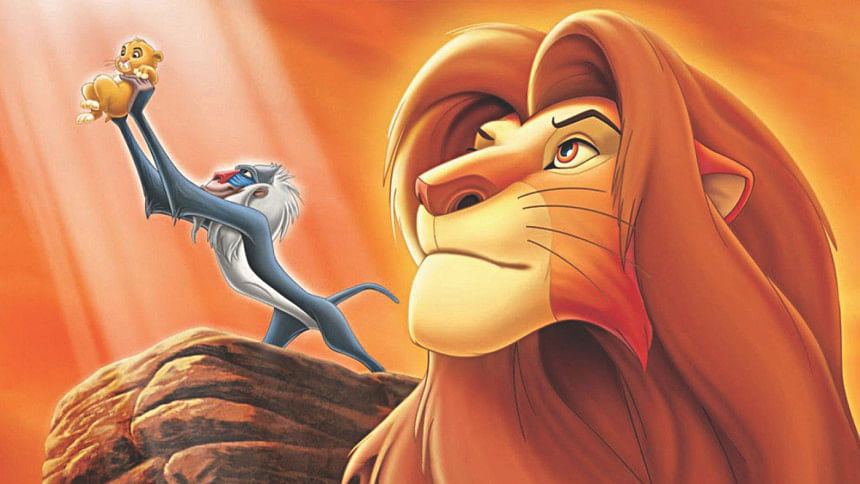
But as nearly every other review of The Lion King unanimously agrees, the movie looks like a National Geographic documentary with voice-overs for the featured animals. So completely are you submerged in this animal world, in the absence of human characters, that to watch the creatures crying, singing, and roaring in English feels absurd. You connect to the story only because you already know what to expect. And you feel particularly let down by this diluted version of Simba crying beside his dead father and the climactic “I killed Mufasa!” delivered by Scar.
It’s no mystery as to why Disney has settled on this remake spree. Compared to its recent flop releases John Carter (2012) and Tomorrowland (2015), Tim Burton’s Alice in Wonderland (2015) and Bill Condon’s Beauty and the Beast (2017) earned over a billion dollars. Both The Jungle Book and Aladdin have (so far) skirted the USD 960 million range, and The Lion King has already earned as much just over the past two weeks since its release. The Mulan trailer is fresh out of the oven, and The Little Mermaid is set to follow soon.
While Disney earns its big bucks, for its vast fanbase the remakes offer an adjusted lens through which to better understand some of their favourite childhood stories. The live action Beauty and the Beast tweaked the story just enough for each character to gain greater agency and nuance. We meet a stronger, more fleshed out and therefore more believable version of not only Belle and the Beast, but also Gaston, LeFou, Maurice...them all. Aladdin, to its discredit, took the fieriest of Disney princesses and diluted her into a heroine who cries, sings, and occasionally slips out a snarky remark here and there. But it also made Will Smith’s Genie a far-more human version than that of Robin Williams’ —giving him a love interest, skewing his musical taste more towards hip-hop and away from Williams’ jazzier numbers. As an audience, you’re therefore made to pay closer attention to Genie’s perpetual struggle to be more human, more himself, and less a cog in his masters’ tales. He’s more himself right from the beginning and not just at the end when Aladdin deigns to set him free. Meanwhile with the upcoming releases—the news of Halle Bailey signing on as Ariel has triggered important discussions on social media about how comfortable we are, how comfortable we should be, with imagining our favourite Disney characters as anything but white.
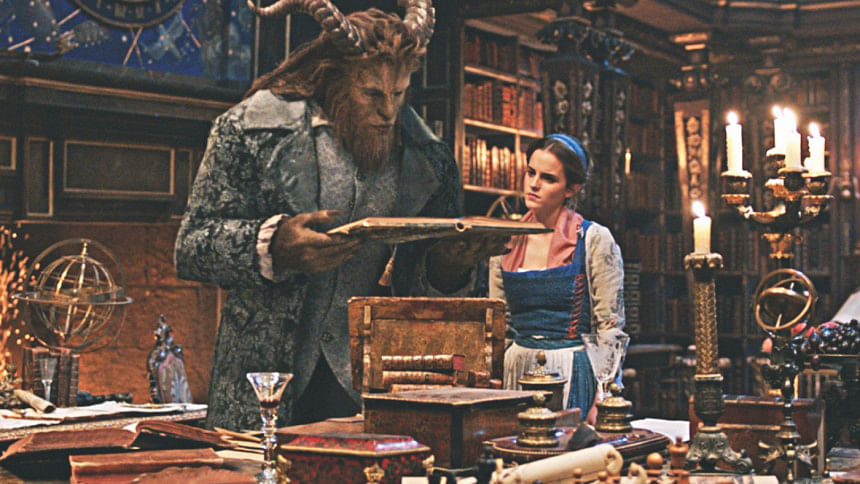
Unfortunately, in staying too faithful to the original, The Lion King remake offers few, if any, of these added insights. Hans Zimmer’s soundtrack is heart-wrenching—Beyonce’s new number Spirit in particular—as are the scenes of Mufasa and Simba frolicking at sunset, and a more grownup Simba with Timon and Pumba all but blanketed by a diamond-studded sky. You laugh, you sing, you jump when lion roars pierce through the scene. But you could just revisit the 1994 original for the same, if not a higher, amount of feels.
The writer can be reached at [email protected]

 For all latest news, follow The Daily Star's Google News channel.
For all latest news, follow The Daily Star's Google News channel. 



Comments